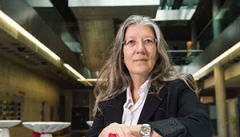
Education
Isabelle Collet: the voice and the pen of the digital ‘left behinds’
The computer scientist, lecturer researcher and writer Isabelle Collet has many strings to her bow. In her latest book, ‘Les oubliées du numérique’ (ed. Le Passeur), she addresses computer science for the second time in one of her books, especially the place of women in this discipline. Interview with a woman who is very committed to the issue of gender and diversity, and is also Vice-Chair of the Board of Directors of INSA.
How has the gender issue become central to your life?
‘It became essential when I couldn’t find a job. I had a computer science degree in Signal Processing under my belt and I thought I was at the top of my abilities. I had thought of pursuing a Master’s degree, but there were few women and as I was not necessarily pushed, I thought I wasn’t good enough. I was 4th in my class.
So I joined the labour market in the early 1990s, married without children, and I had a succession of temporary contracts. Then I become a mother and my husband found work in Paris. I took courses at Paris Nanterre University and one of them was on gender relations in education. Little by little, I understood. I had experienced the social censorship that women and girls experience, which leads them either to doubt their skills or to think they have better skills in other areas. I did my thesis on this’.
Your book, ‘Les oubliées du numérique’ has a subtitle: ‘L’absence des femmes dans le monde digital n’est pas une fatalité’ (the absence of women in the digital world is not inevitable). Is it really an absence?
‘When we are talking about a percentage of 10 to 12%, then yes, that’s an absence. In the technical heart of the digital world, the percentage of women is 15%, and in the hottest sectors such as big data and cyber security, the figure drops to 11%. In the digital world, the more advanced the sector, the fewer women there are. And every time a field of knowledge expands, men rush into it. Women are socialised to think that having a family will leave them fulfilled.
But today, I think we are moving towards a balance. We have good reason to believe that things are changing. There are many initiatives to attract women into the digital world, and some indicators are encouraging, such as the percentage of girls studying the three most popular Master’s degrees in business informatics, which is between 30 and 40% this year’.
You have been Vice-Chair of the Board of Directors of INSA Lyon for a year. What are your thoughts on the presence of girls at INSA?
‘43% of first-year engineering students at INSA Lyon are female, which is encouraging! It is a school that has long been interested in the issue of gender diversity and can reap the rewards of this. That was one of the reasons why I agreed to join the Board of Directors of this institution. I knew that there was a real focus on social and gender diversity. I have known this for a long time because my sister studied at INSA and I myself applied. INSA is dedicating resources to address these issues and now there is even the Institut Gaston Berger to study them’.
In your opinion, where can we find the answers to promote diversity?
‘Everywhere. They can be found at all levels. Inequalities in the gendered representation of subjects from nursery school through to higher education must be addressed. It’s in education, media, corporate culture - everywhere!’
Photo credits ©Sabine Papilloud

